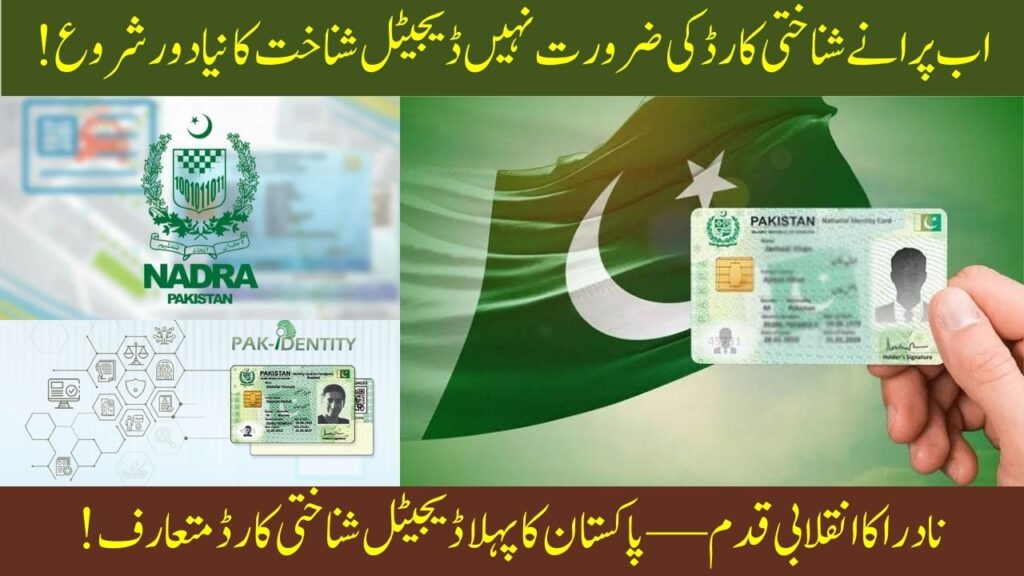Pakistan’s National Database and Registration Authority (NADRA) has unveiled the country’s first digital identification card, marking a significant advancement in the nation’s digital transformation journey. The innovative system aims to streamline identity verification processes while enhancing security and accessibility for citizens.
Also Read: Asaan Karobar Card Apply Online 2025 – Full Guide for Interest-Free Business Loans
Revolutionary Digital Identity Solution
The new Digital ID Card represents a major technological leap for Pakistan’s identification infrastructure. Unlike traditional physical ID cards, the digital version can be accessed through a secure mobile application, allowing citizens to carry their identification credentials on their smartphones.
“This initiative places Pakistan among the world’s forward-thinking nations implementing digital identity solutions,” said NADRA Chairman Muhammad Tariq Malik during the official launch ceremony in Islamabad. “The Digital ID Card will transform how citizens interact with both government and private services.”
The digital identification system employs multi-factor authentication and advanced encryption protocols to ensure security. According to NADRA officials, the system includes biometric verification features and is designed to prevent identity theft and fraud.
Implementation and Rollout Plan
The Digital ID Card program will roll out in phases, beginning with major urban centers before expanding nationwide. During the initial phase, citizens can opt for the digital ID alongside their physical cards, with plans for the digital version to eventually serve as the primary identification method.
Federal Minister for Interior Mohsin Naqvi expressed strong support for the initiative during the launch event, emphasizing its role in advancing Pakistan’s digital ecosystem.
“The Digital ID Card represents a cornerstone of our vision for Digital Pakistan,” Naqvi stated. “This technological advancement will not only facilitate daily transactions but also significantly reduce bureaucratic hurdles that citizens face when accessing services.”
NADRA has established dedicated helplines and service centers to assist citizens during the transition. The authority has also developed a comprehensive awareness campaign to educate the public about the benefits and security features of the new digital identification system.
Pakistan Digital ID Card Features and Benefits
The Digital ID Card comes with several innovative features designed to enhance user experience and security:
- Real-time verification: Government agencies and authorized private entities can verify identities instantly
- Reduced documentation: Citizens can use the digital ID to fulfill KYC requirements across multiple services
- Privacy controls: Users maintain control over what information is shared during verification processes
- Offline functionality: The system works even without continuous internet connectivity
- Forgery prevention: Advanced security features make the digital ID significantly harder to forge than physical cards
Dr. Ayesha Khan, a digital governance expert at Quaid-i-Azam University, views the development as transformative for Pakistan’s digital landscape.
“NADRA’s Digital ID initiative addresses several critical challenges in our identification ecosystem,” Dr. Khan explained in an interview. “It reduces the cost of ID issuance, minimizes fraud, and makes government services more accessible to citizens regardless of geographic location.”
Addressing Digital Divide Concerns
While celebrating the technological advancement, NADRA has acknowledged concerns about digital access disparities across the country. According to recent statistics, approximately 35% of Pakistan’s population lacks reliable internet access, particularly in rural areas.
“We recognize the digital divide challenges and have implemented measures to ensure no citizen is left behind,” NADRA Chairman Malik addressed during a press briefing. “Physical ID cards will remain valid indefinitely, and we are establishing Digital Access Points in underserved areas to ensure everyone benefits from this advancement.”
The authority has partnered with telecommunication companies to improve connectivity in remote regions and is offering subsidized smartphones to economically disadvantaged citizens who wish to access the digital identification system.
International Recognition and Security Standards
The Digital ID Card system meets international security standards and has received recognition from global digital identity forums. NADRA officials confirmed that the system complies with regulations set by the International Organization for Standardization (ISO) and incorporates best practices from successful digital ID implementations in other countries.
“We’ve benchmarked our system against the world’s most secure digital identity frameworks,” stated Asad Qaiser, NADRA’s Director of Cybersecurity. “The multi-layered security approach ensures that citizens’ sensitive information remains protected from emerging cyber threats.”
Economic and Governance Impact
Economic analysts predict significant economic benefits from the digital identification system. According to a report by the Pakistan Institute of Development Economics, the Digital ID Card could potentially save the government billions of rupees annually by reducing administrative costs and preventing identity fraud in welfare programs.
The World Bank has also praised the initiative, noting in a recent statement that “robust digital identification systems can boost financial inclusion, reduce corruption, and improve public service delivery.”
For ordinary citizens, the Digital ID Card promises to simplify everyday transactions. From opening bank accounts to registering for government services, the digital verification process significantly reduces processing times and paperwork.
Looking Forward
As Pakistan continues its digital transformation journey, the Digital ID Card represents a foundational element of the country’s evolving digital infrastructure. NADRA has indicated plans to expand the system’s functionality to include integration with digital payment systems and additional government services.
“This is just the beginning,” Chairman Malik concluded at the launch event. “The Digital ID Card will serve as the cornerstone for building a more connected, efficient, and secure Pakistan in the digital age.”
With this landmark initiative, Pakistan joins a growing list of countries embracing digital identification solutions to improve governance and service delivery in an increasingly digitized world.
